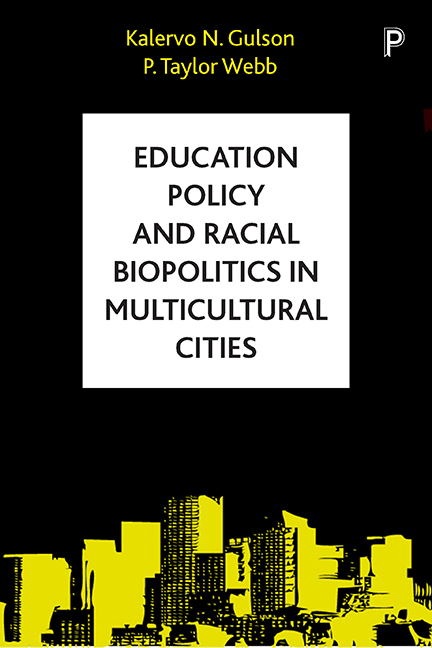Book contents
- Frontmatter
- Contents
- Notes on authors
- Acknowledgements
- Foreword
- Introduction: education policy and multicultural cities
- One Policy events
- Two Policy and biopolitics: the event of race-based statistics in Toronto
- Three The (micro)politics of racial neoliberalism With Viviana Pitton
- Four ‘Up in the northwest corner of the city’: the city, race and locating the school
- Five Difference and recognition
- Six Policy events, race and the future of the city
- References
- Index
Six - Policy events, race and the future of the city
Published online by Cambridge University Press: 05 April 2022
- Frontmatter
- Contents
- Notes on authors
- Acknowledgements
- Foreword
- Introduction: education policy and multicultural cities
- One Policy events
- Two Policy and biopolitics: the event of race-based statistics in Toronto
- Three The (micro)politics of racial neoliberalism With Viviana Pitton
- Four ‘Up in the northwest corner of the city’: the city, race and locating the school
- Five Difference and recognition
- Six Policy events, race and the future of the city
- References
- Index
Summary
It was all about how do you meet the needs of the students and their families? And it wasn't that an Africentric school was the answer. It was that there wasn't one answer. (Black Canadian, Trustee, TDSB)
This book has worked from the premise that policy is ad hoc and uncertain, and that one way to undertake policy analysis is through a policy problematisation that would ‘identify conditions and registers that have disqualified parallel (that is, rival, contradictory) thoughts, practices, and enactments’ (Webb and Gulson, 2015a: 40). We have explored the multiple ways in which the policy event of the Africentric Alternative School could be traced and mapped, to speak to the idea that there was no one answer either to Black schooling in Toronto or to why and how the school was established. Our policy problematisation has identified several effects of the policy event (the development of the Africentric Alternative School) that do not have clear outcomes or hidden truths.
In each chapter we have been interested in the idea that policy events have no determinate outcomes – and no determinate origins – which reproduce events due to the role that chance has in our evental lives. As we outlined in the introductory chapter, we have been interested in the idea of an abductive approach, as ‘concerned with the relationship between a situation and inquiry’ (Brinkmann, 2014: 722), that meant – as St Pierre and Jackson noted (citing Deleuze and Guattari) – that we work ‘through the middle’ without a beginning or end to analysis (St Pierre and Jackson, 2014). In these final thoughts of this book, we realise we have, perhaps, been undertaking work not just ‘through the middle’ but that we have attempted to undertake what Deleuze called looking at ‘in between’, and that this sums up our interest in refusing one or even multiple ‘origins’ linked to narrative expositions about the Africentric Alternative School. Deleuze, in reflecting on contemporary thought, stated:
If things aren't going too well in contemporary thought, it's because there's a return under the name of ‘modernism’ to abstractions, back to the problem of origins, all that sort of thing … It was no longer a question of starting or finishing.
- Type
- Chapter
- Information
- Education Policy and Racial Biopolitics , pp. 121 - 132Publisher: Bristol University PressPrint publication year: 2017



